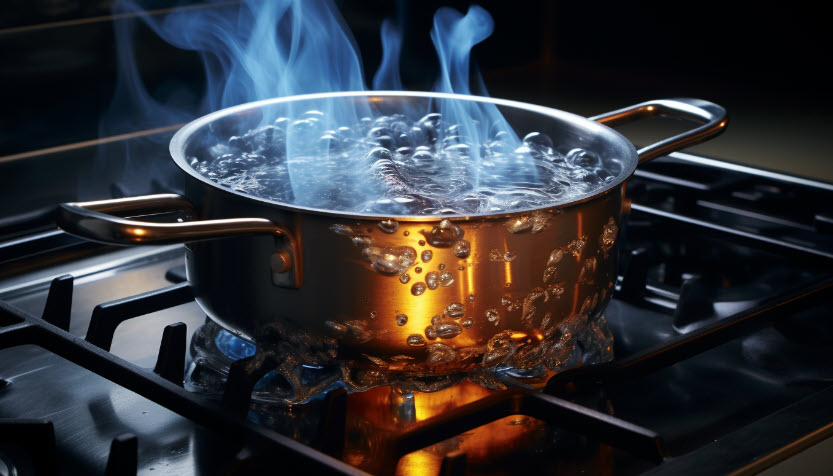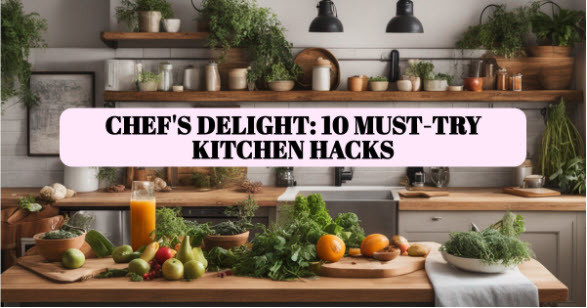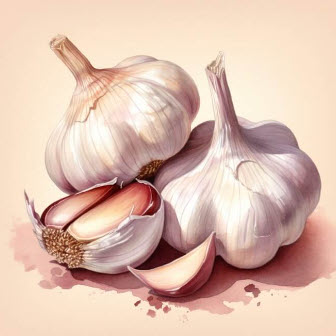Prepare to elevate your culinary skills with these ingenious kitchen hacks that will revolutionize the way you cook at home. From eliminating tears while cutting onions to efficiently removing eggshells from cracked eggs, these crucial tricks will save you time and frustration in the kitchen.
Table of Contents
Whether you’re a seasoned home chef or just starting out, these expert tips and tricks are guaranteed to enhance your cooking experience and impress your guests. Say goodbye to kitchen mishaps and hello to smooth cooking success with these 10 game-changing hacks.

Key Takeaways:
- Properly storing fresh herbs: Wrap fresh herbs in a damp paper towel and store them in a resealable plastic bag in the refrigerator to keep them fresh for longer.
- Preventing tears when chopping onions: Chill the onion in the freezer for 15 minutes before chopping to help reduce the release of eye-irritating gases.
- Peeling garlic quickly: Place a garlic bulb in the microwave for 15 seconds before peeling to make the cloves easier to separate and peel.
- Reviving stale bread: Sprinkle a few drops of water on stale bread and bake it in the oven for a few minutes to make it soft and fresh again.
- Removing eggshells easily: Wet your fingers before attempting to remove eggshells from cracked eggs to help the shells slide off more easily.
Efficient Cutting Board Cleanup
Kitchen Hacks – Wet towel trick
One handy kitchen hack for efficient cutting board cleanup is the wet towel trick. Simply dampen a kitchen towel or paper towel and place it under your cutting board before starting your prep work. The moisture from the towel creates a non-slip surface, preventing your cutting board from sliding around as you chop and dice ingredients.
Scraping with a bench scraper
Another effective method for cleaning your cutting board is scraping off excess food scraps and residue with a bench scraper. This tool, also known as a dough scraper, can quickly gather up all the debris left on the board, making it easy to dispose of and leaving less mess behind.
Scraping with a bench scraper is not only efficient but also helps to prevent cross-contamination in the kitchen by ensuring all food particles are properly removed from the cutting board surface. It is recommended to use a bench scraper with a sturdy handle and sharp edge for the best results.
Quick Ripen Fruits
Kitchen Hacks – Paper bag technique
There’s a simple trick to quickly ripen fruits like bananas, avocados, and tomatoes by using the paper bag technique. Place the fruit in a paper bag and fold the top to trap ethylene gas, which speeds up the ripening process. This method is effective and can ripen fruits in just a day or two.
Apple ethylene method
There’s a method that involves using apples to ripen other fruits faster. Apples naturally produce ethylene gas, a ripening agent that can help accelerate the ripening of other fruits placed nearby. This method is especially useful for firm fruits like peaches, pears, and bananas.
Any fruit that is exposed to the ethylene gas produced by apples will significantly speed up the ripening process. Remember to keep the fruits in a closed space or bag to allow the ethylene gas to concentrate around the fruits that need to ripen faster. This technique is a game-changer for quickly ripening fruits when you’re in a hurry to use them in your recipes.
Easy Herb Chopping
Roll-and-slice method
All you need to do to chop herbs quickly and efficiently is to gather them up into a tight bundle and roll them tightly into a cylinder shape. Once rolled, simply slice through the cylinder with a sharp knife to produce perfectly chopped herbs. This technique works best for leafy herbs like basil, mint, or parsley.
Pre-freezing technique
When you have excess herbs that you want to keep for later use, the pre-freezing technique is a game-changer. Simply chop the herbs and place them into ice cube trays, then fill them with water and freeze them. Once frozen, transfer the herb cubes into a freezer-safe bag for convenient storage. When cooking, simply pop out a cube and add it to your dish for fresh herb flavour anytime.
You can use this pre-freezing technique for a variety of herbs, including cilantro, thyme, and chives. This method not only preserves the herbs’ flavour and aroma but also ensures you have them on hand whenever needed, saving time and reducing waste.
Peel Garlic Swiftly
Kitchen Hacks Shaking container method
Now, let’s explore the shaking container method for peeling garlic in seconds. This clever technique involves placing garlic cloves inside a container, whether it’s a mason jar or a metal tin, and shaking vigorously for a few seconds.
Warm water soak
The warm water soak method is another effective way to peel garlic effortlessly. For this method, simply place the garlic cloves in a bowl of hot water for a few minutes. The warm water helps to loosen the skins, making them easier to peel.
For an added tip, you can also microwave the garlic cloves for a few seconds before placing them in the hot water. This will further soften the skin and speed up the peeling process.
Avoid Potato Browning
Cold water immersion
Your first line of defence against potato browning is cold water immersion. After peeling or cutting your potatoes, submerge them in a bowl of cold water. This prevents exposure to oxygen, which is the main culprit behind the unsightly discolouration.
Lemon juice application
While cold water immersion is effective, lemon juice application takes it a step further. Simply mix a few tablespoons of lemon juice in the water before soaking your potatoes. The citric acid in the lemon juice not only prevents browning but also adds a subtle citrus flavour to your dishes.
Lemon juice is a natural antioxidant that inhibits the oxidation process in potatoes. It is also a safe and chemical-free alternative to commercial anti-browning agents. By using lemon juice, you can ensure your potatoes stay fresh and appetizing for longer periods.
Perfect Sunny-Side Eggs
Kitchen Hacks Water basting trick
Unlike traditional frying methods, mastering the perfect sunny-side-up egg requires finesse and precision. One brilliant kitchen hack is the water-basting trick. You can add a few drops of water to the hot pan and cover it with a lid. The steam created will gently cook the top of the egg without the need to flip it.
Lid steaming method
Eggs can be tricky to cook, especially when you want the whites fully set with a runny yolk. Using the lid steaming method can help achieve this delicate balance effortlessly. You can crack the egg into a hot pan, add a splash of water, and immediately cover it with a lid. The trapped steam will cook the top of the egg to perfection while keeping the yolk gloriously runny. This method reduces the risk of overcooking the egg while ensuring a creamy centre.
Non-Stick Grating Cheese
Kitchen Hacks Freezer firming solution
Keep your cheese firm for grating by placing it in the freezer for about 30 minutes before using it. The cold temperature will make the cheese less likely to clump together and will result in a smoother grating process.
Cooking spray aid
Even with a non-stick grater, cheese can still sometimes stick. An easy solution is to lightly spray the grater with cooking spray before you start grating. This will help the cheese slide more easily across the surface, resulting in a more efficient and less messy grating process.
NonStick Cooking spray can also prevent the cheese from sticking to the grater, making cleanup a breeze. Remember not to overspray, as too much cooking spray can leave a residue on the cheese.
Extend Banana Shelf Life
Plastic wrap stem
Not only is it frustrating when bananas start to turn brown and mushy too quickly, but it’s also wasteful. One simple trick to extend the shelf life of your bananas is to wrap the stems in plastic wrap. The stems release ethylene gas, which speeds up the ripening process. By covering the stems with plastic wrap, you can slow down the ethylene production and keep your bananas fresh for longer.
Kitchen Hacks – Separate from the bunch
The worst thing you can do is leave bananas on the bunch while trying to extend their shelf life. Once a banana starts to ripen, it releases ethylene gas that can cause the other bananas to ripen too quickly. To prevent this, make sure to separate the bananas from the bunch and store them individually. This way, you can prevent the spread of ethylene and keep your bananas fresh and firm for a longer period.
On the counter, bananas ripen quickly due to the ethylene they produce. If you want to slow down the ripening process, store bananas in the refrigerator. The cold temperature will slow down the enzymatic reactions that cause bananas to ripen quickly. Just keep in mind that the peel may turn brown in the fridge, but the fruit inside will stay fresh for a longer time.
Quick Soften Butter
Grating or Slicing
Many home chefs struggle with using hard butter when a recipe calls for softened butter. One quick and easy solution is to grate or slice the cold butter into smaller pieces. By increasing the surface area, the butter will soften much faster at room temperature. This method is efficient and perfect for spontaneous baking sessions.
Warm glass method
Any chef who needs softened butter urgently can use the warm glass method. All you need to do is boil some water and pour it into a glass to warm it up. Pour out the water and cover the stick of butter with the warm glass. The residual heat will soften the butter in minutes, making it perfect for spreading or creaming.
Some precautions should be considered when using the warm glass method to soften butter. Glass containers can become very hot, so handle them with care to avoid burns. Additionally, ensure the glass is dry before covering the butter to prevent any water from getting into your recipe.
Easy Peel Hard-boiled Eggs
Not being able to peel hard-boiled eggs without half the white coming off can be frustrating. But fear not, with these brilliant kitchen hacks, you’ll be peeling eggs like a pro in no time.
Baking soda addition
Any home chef can benefit from this simple trick to make peeling hard-boiled eggs a breeze. Just add a teaspoon of baking soda to the water before boiling the eggs. The alkaline in the baking soda helps to break down the proteins in the egg whites, making them less likely to stick to the shell.
Ice water bath
An ice water bath is another crucial step to ensure easy-to-peel hard-boiled eggs. After boiling the eggs, immediately transfer them to a bowl of ice water. Let them sit for about 10 minutes to shock the eggs and stop the cooking process. This helps to contract the egg whites from the shell, making it easier to peel.
You can prevent the greenish ring around the yolk by not overcooking your eggs. This discolouration is a sign of overcooking and can affect the taste and texture of the eggs. By following these simple tips, you’ll be enjoying perfectly peeled hard-boiled eggs in no time!
To wrap up Kitchen Hacks
With this in mind, incorporating these 10 brilliant kitchen hacks into your cooking routine can truly transform your culinary experience. From avoiding tears while chopping onions to keeping your herbs fresher for longer, these tips and tricks will make you feel like a pro in the kitchen. Whether you are a seasoned home chef or just starting out, these hacks are sure to save you time, effort, and frustration while elevating the flavours of your dishes. So, why not give them a try and see the difference they can make in your cooking? Happy cooking!
FAQ
Q: What is one kitchen hack to easily peel garlic?
A: To easily peel garlic, place the cloves in a small bowl, cover it with another bowl, and shake vigorously for a few seconds. The friction will help remove the peels effortlessly.
Q: How can I prevent my cutting board from slipping while chopping ingredients?
A: To prevent your cutting board from slipping, place a damp paper towel or a non-slip mat underneath. This will provide friction and stability while you chop.
Q: What is a quick way to ripen avocados if I need them ripe for a recipe?
A: To quickly ripen avocados, place them in a brown paper bag with a banana or apple. The ethylene gas released by the fruit will speed up the ripening process.
Q: How can I revive stale bread?
A: To revive stale bread, sprinkle it with water and then place it in a 350°F oven for 5-10 minutes. The steam created will help soften the bread and make it taste fresh again.
Q: What is a clever way to prevent pots from boiling over?
A: To prevent pots from boiling over, place a wooden spoon across the top of the pot. The spoon will pop the bubbles and prevent the water from spilling over.

CLICK HERE to get a full list of easy kitchen hacks.
If you need any further information or assistance with this kitchen hacks article, Contact Us





















